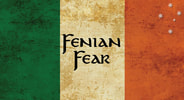The term Fenian hails back to ancient Celtic times (1000 years ago) when pagan tribes ruled Ireland. One tribe that stood out was the Fianna led by a warrior named Finn Mac Cool, who on legend, was reputed to be the fiercest and respected Fianna of all. Back in those times, Ireland was constantly being invaded from tribes from the north of Europe and it was Mac Cool and his Fianna called upon to repel its invaders.
It was during the Great Famine (1844 - 1852), that the true seed of Fenianism was sown. Prior to the ravages of famine, Ireland’s population was believed to be in the order of 8 million souls; however by the time the famine had run its rapacious course, Ireland’s population had fallen by almost half. Starving and homeless, hundreds of thousands of Irish fled their devastated country to safe havens in America, England, Canada, New Zealand and Australia.
On reaching their adopted countries, some, due to horrors they’d endured in the famine, decided ‘enough was enough’ and it was time their English landlords - who at the height of the famine (according to custom export records) - had shipped (under military guard) scarce food grown on land stolen from them to their estates in England while they starved - would pay dearly for their inhumanity.
With most famine survivors finding refuge in America, the Fenian Brotherhood (FB) was formed in New York under the command of John O’Mahony, a veteran of the 1848 rebellion; while survivors in Ireland would form the Irish Republican Brotherhood (IRB) under the command of James Stephens, also an 1848 veteran. Members of both groups including their sympathisers would be collectively referred to as Fenians. To become a full fledged Fenian, it was expected by new recruits to swear an allegiance to the Fenian oath:
‘I, A B, in the presence of the Almighty God, do solemnly swear allegiance to the Irish Republic, now virtually established, and that I do my very utmost, at every risk, while life lasts, to defend its independence and integrity; and, finally, that I will yield implicit obedience in all things, not contrary to the laws of God, to the commands of my superior officers. So help me God. Amen.’
Sourcing most of their financial and political support from within America, the FB and IRB would form Fenian chapters (societies) in Canada, England, New Zealand and Australia.
It was during the Great Famine (1844 - 1852), that the true seed of Fenianism was sown. Prior to the ravages of famine, Ireland’s population was believed to be in the order of 8 million souls; however by the time the famine had run its rapacious course, Ireland’s population had fallen by almost half. Starving and homeless, hundreds of thousands of Irish fled their devastated country to safe havens in America, England, Canada, New Zealand and Australia.
On reaching their adopted countries, some, due to horrors they’d endured in the famine, decided ‘enough was enough’ and it was time their English landlords - who at the height of the famine (according to custom export records) - had shipped (under military guard) scarce food grown on land stolen from them to their estates in England while they starved - would pay dearly for their inhumanity.
With most famine survivors finding refuge in America, the Fenian Brotherhood (FB) was formed in New York under the command of John O’Mahony, a veteran of the 1848 rebellion; while survivors in Ireland would form the Irish Republican Brotherhood (IRB) under the command of James Stephens, also an 1848 veteran. Members of both groups including their sympathisers would be collectively referred to as Fenians. To become a full fledged Fenian, it was expected by new recruits to swear an allegiance to the Fenian oath:
‘I, A B, in the presence of the Almighty God, do solemnly swear allegiance to the Irish Republic, now virtually established, and that I do my very utmost, at every risk, while life lasts, to defend its independence and integrity; and, finally, that I will yield implicit obedience in all things, not contrary to the laws of God, to the commands of my superior officers. So help me God. Amen.’
Sourcing most of their financial and political support from within America, the FB and IRB would form Fenian chapters (societies) in Canada, England, New Zealand and Australia.

